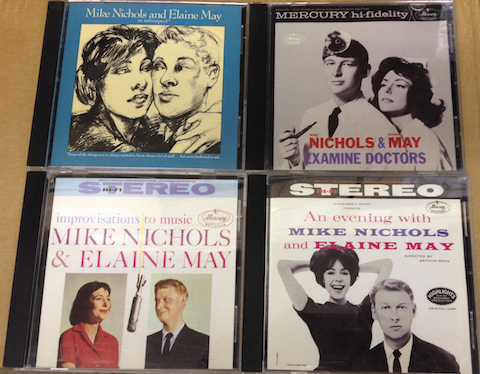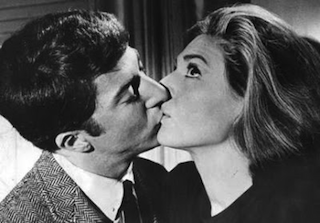I was in my first year of radio, working at my second station, in Naples, Florida.
On Saturdays I worked an 8 (or was it 10?)-hour shift, babysitting the network feed.
A few times each hour, I’d pop into the studio and play the local commercials and station I.D.
I spent much of the rest of my time browsing through the station’s record library, immediately outside the broadcast studio.
It was there I came across several LPs by Mike Nichols & Elaine May.
And my world changed.
Photo courtesy of the Dan O’Day collection.
I’d never heard anything like it. Two voices. Two people conversing.
On the surface, a comedy sketch. Just beneath, sharp commentary on our culture and, sometimes, the human condition (aka the silliness of humans).
Is there a style of music you absolutely love? When you hear it, it’s as though it was written or performed on your own personal wavelength?
That’s how it was for me with Nichols & May. They just happened to be on my personal wavelength.
From the first time I heard them, I experienced their performance as a musical style that I loved.
It was a dozen years later before I experienced that sensation again.
I had moved back to Los Angeles. At the time, L.A. had a thriving Equity Waiver (i.e., tiny theaters with little if any budget) scene, and I had subscribed to some service that offered half-price theatre tickets.
One day they offered tickets to something called Sills and Company. I had no idea what that might be, but it was half-price and I had nothing else to do.
Sills and Company was in East Hollywood. On or near Heliotrope Drive. It looked like a converted garage.
It turned out “Sills” was Paul Sills. I’d never heard of him.
Soon I’d learn he was co-founder of Chicago’s Compass Theater and its successor, Second City.
The entire evening consisted of improvisational “theater games,” played by a company that included Valerie Harper, Dick Schaal, Richard Libertini (who was breathtakingly brilliant at improv), Severn Darden (considered by many to be the ultimate improv genius), Garry Goodrow and Avery Schreiber, among others.
Paul Sills would call two or more players onstage, tell them what game they were playing and then stand on the sidelines, waiting for magic to happen.
That night, I heard that music again, for the first time in more than a decade.
It wasn’t similar to what I had felt when listening to Nichols & May; it was the same feeling.
Only later did I learn that the team of Nichols & May was born in Chicago, as members of the Compass Theater, directed by Paul Sills.
In fact, it was Sills who introduced them to each other, saying, “‘I want you to meet the only other person on the campus of the University of Chicago who is as hostile as you are.’”
Remember the scene in THE GRADUATE when Anne Bancroft (Mrs. Robinson) is smoking a cigarette and Dustin Hoffman summons the courage suddenly to kiss her…and when he finishes, she exhales a cloud of smoke?
That moment was directly lifted from a Nichols & May sketch created years earlier. No one ever accused the film’s director of plagiarism; the director was Mike Nichols.
If it weren’t for those Nichols & May records, I’m not sure I ever would have stopped trying to be a great DJ and, instead, begun writing and performing my own material on the radio.
Probably it’s not a coincidence that so much of my stuff was simple, two-voice dialogue.
In radio, time is compressed.
Unlike film or TV, you’re not allowed several minutes to establish a character or scene. From your very first words, your audience needs to know who and where you are.
By “who,” I don’t mean just the identity of your character. Your listeners quickly should understand the attitude of your character.
Occasionally I’ll illustrate this with the opening of one of Nichols & May’s most famous routines:
With that one line, Elaine told us volumes about her character. That was a woman guided by an obstructive nature, and she’d never voluntarily help a customer.
Here’s the entire routine:
Humor, like music, produces a subjective experience for those who consume it.
I can’t speak for you.
But for me, listening to that routine again today, more than 50 years after it was recorded, is just as exhilarating as it was the first time I heard it outside the broadcast studio in that little radio station in Florida.



